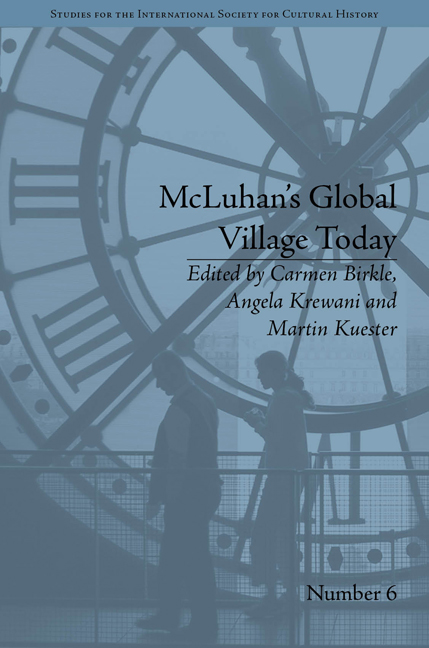Book contents
- Frontmatter
- CONTENTS
- List of Contributors
- List of Figures
- McLuhan's Global Village Today: An Introduction
- Part I McLuhan and Media Theory
- Part II McLuhan and Literature
- 7 Herbert Marshall McLuhan: Before The Mechanical Bride
- 8 ‘Cambridge was a Shock’: Comparing Media from a Literary Critic's Point of View
- 9 Master, Collaborator and Troll: Marshall McLuhan, Wilfred Watson and Brian Fawcett
- 10 Taking Action: What Comics Demand of their Recipients
- Part III McLuhan and Technical Media
- Notes
- Index
8 - ‘Cambridge was a Shock’: Comparing Media from a Literary Critic's Point of View
from Part II - McLuhan and Literature
- Frontmatter
- CONTENTS
- List of Contributors
- List of Figures
- McLuhan's Global Village Today: An Introduction
- Part I McLuhan and Media Theory
- Part II McLuhan and Literature
- 7 Herbert Marshall McLuhan: Before The Mechanical Bride
- 8 ‘Cambridge was a Shock’: Comparing Media from a Literary Critic's Point of View
- 9 Master, Collaborator and Troll: Marshall McLuhan, Wilfred Watson and Brian Fawcett
- 10 Taking Action: What Comics Demand of their Recipients
- Part III McLuhan and Technical Media
- Notes
- Index
Summary
In 1969 Marshall McLuhan published a collection of his literary essays, The Interior Landscape: The Literary Criticism of Marshall McLuhan 1943–1962, including ‘Joyce, Mallarmé, and the Press’. Looking at these essays it is clear that McLuhan's theory of media, developed in The Gutenberg Galaxy (1962) and Understanding Media (1964), is essentially influenced by literary criticism. ‘My study of media began and remains rooted in the work of these men’, McLuhan wrote, referring to Richards, Leavis, Eliot and Pound. In the following, basic concepts of McLuhan's major books on the history and theory of media shall be examined with reference to McLuhan's roots in literary studies.
The Literary Critic
MARSHALL McLUHAN is unquestionably the spokesman for the ‘postliterate’ electronics age. By training, he is a scholar (and McGraw-Hill has recently published a collection of his literary essays written from 1943–1962, The Interior Landscape); by temperament, he is a Renaissance Man. No one has been more furiously attacked or more staunchly defended. Whether one fears him or cheers him, he is one of the most influential thinkers of our times.
Such is the information ‘about the author’ at the end of McLuhan's Culture is Our Business (1970). There is McLuhan's glory, there is McLuhan's disputedness, and there is the hint at McLuhan's academic education (‘By training, he is a scholar’) that seemed to be necessary.
- Type
- Chapter
- Information
- McLuhan's Global Village TodayTransatlantic Perspectives, pp. 85 - 92Publisher: Pickering & ChattoFirst published in: 2014



